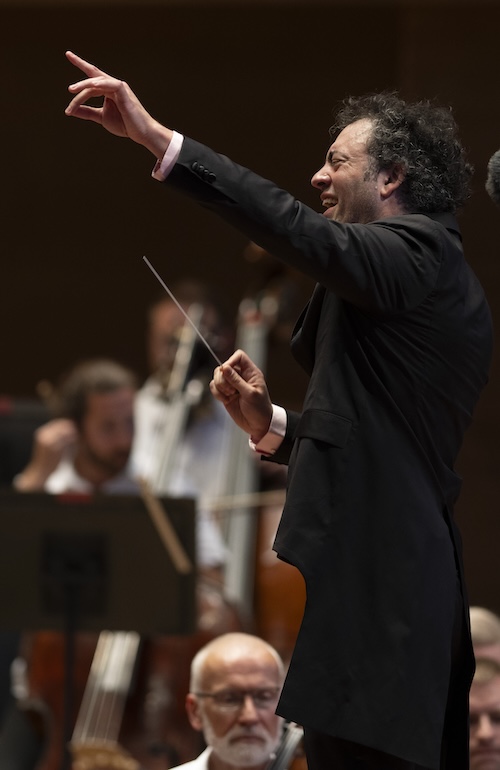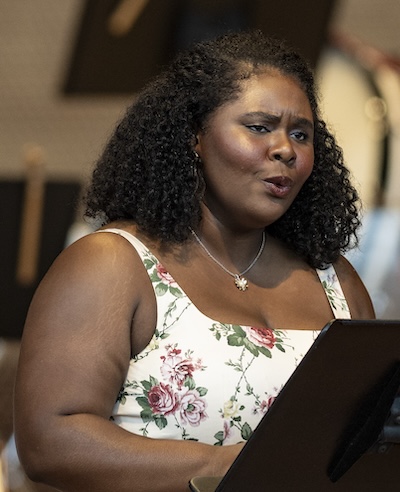A mixed final program for Jacobsen with Grant Park Orchestra

This weekend finds conductor Eric Jacobsen concluding his two-week residency leading the Grant Park Orchestra at Millennium Park. While Jacobsen, co-founder of New York’s The Knights, has made a largely positive impression in his previous programs, the results Friday night at the Pritzker Pavilion were more mixed. That leaves it an open question whether Jacobsen is an obvious choice to succeed outgoing Grant Park artistic director and principal conductor Carlos Kalmar.
Friday’s program opened with Lili Boulanger’s D’un matin de printemps (Of a Spring Morning)from 1918, heard for the first time at the downtown summer series. Boulanger, the younger sister of the famed pedagogue Nadia, was the first woman to claim the coveted Prix de Rome in 1913. She was plagued with health issues throughout her short life and died just two months after completing D’un matin at age 25.
It is hard not to imagine what might have been upon hearing this evocative stanza. The five-minute work opens with a transparent pulsing evocative of early spring awakening. More languid passages ensue with the unmistakable influence of Debussy in harmony and orchestration, before a brief energetic coda closes the work. Jacobsen led a subtle reading that brought out Boulanger’s imaginative engagement with the musical trends of her day.
Poulenc’s Stabat Mater found Jacobsen at work with the Grant Park Chorus in another inventive French opus. The Stabat Mater text treats Mary’s mourning following the crucifixion, and Poulenc composed the 1950 setting following the death of a close friend, turning to his own Roman Catholic faith for solace. The score, in 12 brief movements, is a prime example of the French composer’s spiritual seriousness juxtaposed with his wryer cabaret influences.
From the descending sighs of the opening “Stabat Mater dolorosa,” the chorus was in fine form, singing with flexibility and commitment, thoughtfully prepared as always by director Christopher Bell. They projected enormous collective force in the violent movements that depict Mary’s acute grief, and Jacobsen fluently negotiated Poulenc’s wide range of expression. Moments of choral fire and brimstone had a guttural impact, undergirded by the Grant Park brass, and more playful episodes came off with Gallic charm.

The soprano soloist was Lindsey Reynolds, currently pursuing graduate studies at Curtis and returning to Grant Park following her festival debut last summer. Reynolds possesses a powerful instrument and is an assured presence on stage, though her initial solo movements came off as somewhat stiff Friday, with some harshness at the top of her range. Reynolds sang herself into form, however, palpably conveying the devastation of the final “Quando corpus,” where her lamentation soared over the dense texture of both the chorus and orchestra.
It remains a distracting drag this summer to have to unlock and scroll through one’s phone to read translations at Grant Park choral performances in the absence of printed programs. Might we compromise and at least have a cheaply printed translation available for those concertgoers who care to follow along?
The evening concluded with Rimsky-Korsakov’s Scheherazade. On the basis of Jacobsen’s two previous outings, one expected great things in this Russian orchestral warhorse, but Friday’s performance was surprisingly earthbound for such a kaleidoscopic, crowd-pleasing work.
“The Sea and Sinbad’s Ship” lacked the necessary storm-tossed sweep, and its long melodies felt oddly static. “The Tale of Prince Kalendar” saw inspired solo playing from the principal winds, but Jacobsen struggled to knit these contributions into a coherent narrative, with little of the bardic, story-telling quality one hopes for. Concertmaster Jeremy Black’s beguiling contributions depicting the titular raconteur certainly elevated the performance, but could not counteract the prevailing flat, generalized impression.
Jacobsen’s more spacious approach was better suited to the languors of “The Young Prince and the Princess,” but still one had a sense he was not fully at home with Rimsky-Korsakov’s style. “The Festival at Bagdad” brought some belated fireworks as it cantered along precipitously, and the return of the first movement’s material had the drama that previously had been lacking, but ultimately this was a more muted outing that Jacobsen’s prior podium appearances.
The audience was nonetheless appreciative, and was treated to an encore of Dvořák’s Slavonic Dance No. 8 in G minor from the composer’s Opus 46 set. Jacobsen and colleagues gave an energetic account of this Furiant, punctuating the evening with a bang after the quiet conclusion to Scheherazade.
The program will be repeated 7:30 p.m. Saturday. grantparkmusicfestival.com
Posted in Performances


